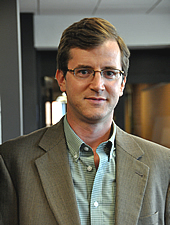The following post comes from W&L Law professor Christopher Bruner. Bruner’s teaching and scholarship focuses on corporate law and securities regulation, including international and comparative dimensions of these subjects. Below, Bruner details his recent trip to Russia as part a team of corporate law experts to discuss corporate and securities law with lawyers and government representatives of the Russian Federation.

During the week of September 10, I traveled to Russia with a delegation of corporate law experts to participate in events hosted by the Supreme Commercial Court of the Russian Federation. The delegation also included Justice Henry duPont Ridgely of the Supreme Court of Delaware (the jurisdiction of incorporation for most U.S. public companies), as well as Roger Magnuson, a partner and Head of the National Strategic Litigation Group at Dorsey & Whitney, and Matthew Elkin, a corporate transactional partner at Morgan, Lewis & Bockius with substantial experience in cross-border investment. The trip was sponsored by the U.S. Russia Foundation for Economic Advancement and the Rule of Law (USRF), a foundation funded by the U.S. government to promote Russia’s transition to a market economy. This was my second USRF-sponsored trip to Russia (having traveled to Moscow and Rostov-on-Don in the same capacity in 2010), and my first trip around the world in a single week. While circumnavigating the globe in eight days on five airlines is not a sustainable travel schedule, I wouldn’t trade the experience for anything.
We began in Moscow, where we met with practicing corporate and securities lawyers to discuss their experiences with the commercial court system and their perceptions of Russian corporate law reform. We then traveled to Vladivostok, the largest city in far eastern Russia and the country’s principal Pacific port,located approximately 40 miles from China and 80 miles from North Korea. The city had recently hosted the Asia-Pacific Economic Cooperation (APEC) meeting, and the scope of infrastructural investment made in anticipation of APEC’s arrival was impressive, including a modernized airport and reconstructed highway connecting it to the city;new bridges,one of which connecting the city to nearby Russky Island now boasts the longest suspended section of any bridge in the world; a new university campus on Russky Island where APEC met, and which Russia’s Far Eastern Federal University will soon inhabit; and a natural gas pipeline from Sakhalin to fuel further growth. It is eminently clear that Russia is turning its eyes to the Pacific – particularly having achieved its long-sought membership in the World Trade Organization in August – and that economic development in and around Vladivostok figures centrally in Russia’s larger strategic goals.
While in Vladivostok we met with U.S. Consul General Sylvia Reed Curran to discuss business conditions in Russia’s far east, and toured the 5th Appellate Commercial Court. While burdensome bureaucracy and official corruption in Russia remain widespread, and a substantial impediment to foreign investment, our hosts at the 5th Appellate Commercial Court took great, and justifiable, pride in the development of new technological capabilities and procedures that will genuinely improve the efficiency and transparency of their commercial court system.
We then participated in two events at the invitation of the Supreme Commercial Court. The first, hosted by the 5th Appellate Commercial Court, was a corporate law seminar for commercial court judges. The seminar included judges from the Supreme Commercial Court, as well as the 5th Appellate Commercial Court and the Commercial Court for the Primorsky Region. At this seminar we focused on topics requested by our Russian counterparts, mainly relating to investor remedies for wrongdoing by corporate managers and controlling shareholders. I spoke about U.S. shareholders’ access to, and statutory right to demand, information relating to a corporation’s business activities – a topic of substantial interest to our counterparts in Russia, where abuse of minority shareholders in privately held companies remains widespread and legal protections continue to take shape.
The next day we participated in an “Asia-Pacific Region Forum,” an event hosted annually by the Supreme Commercial Court since 2007 “to share experience,study the novelties in the legal and economic systems of the countries of the region and to discuss vital issues of the judicial protection of rights”. Titled “Corporate Law: Best Practices for Regulation and Resolution of Disputes,”the Forum included judges from the Supreme Commercial Court of the Russian Federation, the Supreme People’s Court of the People’s Republic of China,the Supreme Court of the Republic of Kazakhstan, and the Supreme Court of Singapore;representatives from the European Bank for Reconstruction and Development and the Corporate Affairs Division of the Organisation for Economic Co-operation and Development (OECD); as well as practitioners and scholars from a number of countries.
At the Forum I presented my recent scholarship on post-crisis U.S. corporate governance reforms, describing the on-going challenges we face here in America in seeking to identify and implement corporate governance structures properly calibrating financial risk incentives, and emphasizing how corporate governance dynamics differ in financial firms due to greater concerns about risk-taking. I then moderated a panel on cross-border corporate relations, which emphasized dynamics of regulatory competition among countries. This is a complex topic of substantial interest to our Russian counterparts, who genuinely value exposure to foreign regulatory models as they seek to improve their own corporate governance system, yet, like other countries, face the challenge of maintaining regulatory autonomy in an age of increasingly mobile investment capital.
My involvement with USRF and acquaintance with judges and other representatives of Russia’s Supreme Commercial Court remain fascinating and deeply rewarding. In evaluating Russia’s corporate legal system it is critical to remind ourselves that, until the 1990s, this was a centrally planned economy with a strongly authoritarian governmental structure. While the challenges faced by Russia’s corporate law reformers remain substantial, I continue to be deeply impressed with their creativity and genuine openness to new ideas – to which I attribute the extraordinary progress they have made in laying the groundwork for a functional market economy in the historically brief post-Soviet period.